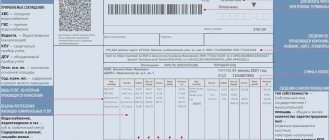Payment for housing and communal services
The owner of the apartment is obliged to pay for utilities in accordance with Article 153 of the Housing Code of the Russian Federation, and this obligation appears at the time of purchase of the apartment, even if no one lives in it.
If the owner does not use certain types of services, this does not exempt him from paying for utilities, but there are ways to significantly reduce costs, for example, if no one is registered in the apartment and no one lives in it.
It must be remembered that utilities and service providers do not know whether someone lives in a particular apartment or not, but in any case it belongs to a certain person, therefore it is considered that he is provided with all services that must be paid for. Amounts payable are calculated every month in accordance with the established procedure.
How much to pay for utilities and gas if no one is registered in the apartment and there is no meter
It should be noted right away that it is impossible to say absolutely exactly how much the owner will have to pay for gas if no one is registered or lives in the apartment. The fact is that the calculation uses a large number of variables, their values will change in each individual case.
Thus, the amount of payment for gas supply in a room not equipped with an individual meter is calculated according to the following formula (clause a) clause 5 of Appendix No. 1 to Decree of the Government of the Russian Federation No. 354):
Pi = [(Si x Ngas.o.) + (ni x Ngas.p.) + (ni x Ngas.a.)] x Tg,
Si – this indicator reflects the total area of housing,
Ngas.o. - standard value of the volume of gas used for heating residential premises,
ni – the total number of registered persons or people living in the apartment on a temporary basis. In this case, this indicator will be equal to zero (since no one is registered),
Ngas.p. – standard value of the volume of gas consumed during the cooking process,
Ngas.in. – standard consumption of blue fuel for heating water (in the absence of a central hot water supply),
Tg – tariff charged for gas (set at the legislative level).
Note that even if a person (the owner of an apartment) lives in another place, he still must pay for utilities used to meet the general needs of the house. In this situation, there is no exemption from such costs. This is written in paragraph 88 of section VIII of Russian Government Decree No. 354.
Provisions of the Housing Code
The procedure for calculating and paying for utilities is prescribed in Section 7 of the Housing Code of the Russian Federation, in particular:
• The payment structure is prescribed in Article 154 of the RF Housing Code;
• The rules for payment for services provided are specified in Article 155 of the RF Housing Code;
• The same article 155 of the RF Housing Code also specifies the terms for making payments;
• Article 157 of the Housing Code of the Russian Federation fixes the amount of payment for utility bills, the calculation of which in most cases is carried out according to installed meters. If meters are not installed in the residential premises, then payment is calculated in accordance with established standards for service consumption per person. In regions, such standards may be different.
Housing and communal services rent: what is included in the payment
The main regulatory legal act containing the main provisions for paying rent is the Housing Code of the Russian Federation (LC RF).
In accordance with clause 1 of Article 153 of the Civil Code of the Russian Federation, citizens, as well as legal entities, are obliged to pay for housing and communal services in a timely manner and in full.
According to paragraph 2 of Art. 154 of the Housing Code of the Russian Federation for owners of living space in an apartment building, the rent includes the following cost items:
- Payment for the maintenance of the premises - this includes remuneration to the management company (for services in managing the apartment building and maintaining its functioning), carrying out routine repairs of the house, payment for utility resources consumed during the use of the common property of apartment owners.
- Contribution for major repairs - this can be repairing the foundation, sealing walls, replacing worn partitions, laying a new roof and other types of work.
- Payment of utilities - in accordance with clause 4 of Art. 154 of the Housing Code of the Russian Federation, this expense item includes payment for cold and hot water supply, electricity, heat, gas, wastewater disposal, as well as household waste removal.
Calculation of payment and what you can refuse
It must be said right away that even if no one lives in the apartment and no one is registered in it, this does not exempt you from paying for the maintenance of the house, since all the necessary procedures of this plan are carried out regardless of whether there are residents in the apartments. Therefore, you cannot refuse this type of payment.
If there are no residents in the apartment, then you can refuse to pay for cleaning the territory of the house and your entrance. To do this, you need to contact the Housing Office and submit an application for exemption from paying this type of utilities due to the absence of residents in the apartment.
Utility companies can exempt a person from paying for certain services only if the person does not use these services and can prove this fact. At the same time, it is impossible to refuse payment for heating, since this service is a common one, as well as for the apartment itself, as a service. You can save on heating if heat meters are installed by lowering the temperature. However, you cannot completely turn off the heating system, as this will lead to breakdown and a very substantial fine.
If, when the apartment owner contacts the companies providing utility services, regarding the refusal of certain services due to the absence of tenants in the apartment, agreement is not reached, the issue can be resolved in court.
In order not to pay for gas in an empty apartment, you must contact the Gas Administration with a request to install a seal on the gas valve. If there is no debt for this service, then the gas service will arrive the next day and seal the valve. If necessary, you can also submit an application for unsealing, but you should also take into account that such services are paid.
You can also refuse water supply services if there are no residents in the apartment. To do this, you should contact Vodokanal and write an application. If the apartment does not have water meters, then the company simply seals the water supply to the apartment. If meters are installed, their readings are recorded and it is noted that there are no residents in the apartment.
Electricity. Everything is much simpler here. You can simply turn it off so that no one can adjust the meter during absence. You can also write a statement to the electrical network stating that no one is currently living in the apartment and the electricity supply is turned off. If the electricity remains connected, you will have to pay a small amount every month, as well as check the meter readings.
How to save gas in an apartment
As you know, the gas bill makes up a significant part of the total amount of payments for housing and communal services. This problem is especially relevant in the winter season, when the heating is turned on. Thus, for many apartment owners the question of whether there is an opportunity to save gas is very relevant.
Thus, we can identify several effective ways to reduce the size of your gas bill. The main ones include:
- Installation of an individual resource meter. Everyone has known for a long time that this is the most effective method; it makes it possible to pay exclusively for the volume of gas that was actually consumed!
- During the cooking process, you should control the strength of the fire - this means that you need to cook exactly at the combustion mode required for a particular dish. In this case, after the liquid boils, the fire should be reduced by half. This will save the amount of gas consumed.
- A rational approach to cooking - for example, if there is a need to bake two apples, you should not turn on the whole oven for this, since such resource losses are impractical. In this situation, it is better to use a microwave oven.
- Insulating walls - this advice applies more to private houses, since in them the main gas consumption is for heating.
- Another method is to install thermal heads on all batteries. This device is a thermostatic valve and a radiator thermostat that allows you to regulate the air temperature in the room.
Garbage removal
But paying for garbage removal, especially if a garbage chute is installed in the house, cannot be refused. Except for those cases when no one is registered in the apartment. Receipts will continue to arrive based on the number of people registered in the apartment.
In order to save on payment for garbage removal, if no one lives in the apartment, you must either check out of it and notify the services about this, or submit an application to the service provider company stating that no one currently lives in this apartment, and the registered person lives at a different address, to which payment must be made.
What housing and communal services cannot be refused?
It is impossible to avoid solid waste management in the first place. This is due to the fact that it is extremely difficult to track who throws and who does not throw garbage into a common container. In this regard, all residents must pay for this service, and the number of people registered in the apartment will be taken into account. The situation will also be the same with such housing services as: maintenance and repair of residential premises, adjacent areas, carrying out repairs, cleaning entrances. All listed services must be paid according to the tariffs established for them. Tariffs for all specified services are set independently by management companies. It will not be possible to abandon them completely. The list of services, as well as the frequency of their provision, are fixed in the management agreement for an apartment building.
Special situations
Special situations include cases when the owner of an apartment lives in it alone, and at the same time goes on long business trips or works on a rotational basis. That is, during certain periods he does not actually live in the apartment and does not use utilities.
In such situations, you can also save on paying for services, but in this case, it is not a refusal of services or payment for them that is issued, but a request for recalculation for the period during which the person was actually absent from the apartment.
You can submit a request for recalculation if the person living in the apartment was absent from it for more than 5 (five) days. In this case, the results of the recalculation will be displayed in receipts for subsequent months of payment. That is, you will have to pay for the period of absence, but in the future the payment amounts will be deducted from payments in the next month (or months).
When submitting an application for recalculation, you must also provide documents proving the absence of a person in the apartment during a certain period, namely:
• Certificate of business trip or shift work indicating the deadlines;
• Train, plane or bus tickets (round trip);
• Document confirming temporary residence in another place.
If a person was absent from the apartment due to inpatient or sanatorium treatment, it is necessary to provide a certificate from the hospital or sanatorium along with the application for recalculation.
If the family went on a visit or vacation for more than 5 days, you can also submit an application for recalculation, attaching tickets and other evidence of absence.
If you don’t pay for gas, after what period of time will they turn it off?
In accordance with clause 1 of Article 155 of the Housing Code of the Russian Federation, apartment owners are required to pay monthly utility bills by the 10th day of the month following the period in which gas, water, etc. were consumed.
In addition to the penalty for late payment of gas (1/300 of the refinancing rate of the Central Bank of the Russian Federation, in effect on the day of payment, for each day of delay), the supplier has the right to completely suspend its supply. This is written in paragraphs. “c)” clause 45 of Government Decree No. 549 of July 21, 2008. Gas supply will be turned off if there is a delay in payment for two consecutive billing periods.
Thus, gas supply is suspended in the following order:
- First, the service provider must notify the debtor of the upcoming event. This is done 20 days before the shutdown date.
- If the owner of the premises does not react in any way to the notification received, then after 20 days the gas supply to his apartment is stopped.
Thus, in order to avoid a situation where you will have to pay for housing and communal services even if you live in another place, you should install an individual gas metering device in your apartment. If this is not possible (for technical reasons), the owner should contact the management company with a request to recalculate the fee.
Legality of charges
It must be remembered that, according to the Rules for the provision of utility services to actual users and owners of residential premises, charges for housing and communal services are possible only if there are officially registered persons in the apartment.
If no one is registered in the apartment, but bills and other payment documents for housing and communal services are sent to this address, then by law they may not be paid. After all, no one actually uses these services. However, it is quite possible that you will have to defend your innocence and rights in court, but if there is documentary evidence, this is not particularly difficult.
In this case, you will only have to pay for general house services and heating.
What measures can be applied to defaulters?
A delay of a month goes unnoticed if in the second month the person repaid the non-payment and this happened once. Punitive measures are applied to persistent defaulters who ignore receipts for two months or more.
⊗ Penalties are accrued from the 2nd month (Article 155 in the Housing Code of the Russian Federation). Penalties will be credited daily, and the percentage depends on the period of delay in payment:
- 1/300 of the refinancing rate of the Central Bank of the Russian Federation – 2-3 months;
- 1/130 – subsequent months (starting from 4).
The amount of the penalty includes: debt * days of delay * 1/300 * refinancing rate.
⊗ Disconnection of services (spot) - the master “cuts off” the supply of electricity/water in a certain apartment. The remaining residents of the house continue to receive utility bills. Services will be connected after 100% repayment of the debt. And this measure is not so common, it is used rarely and only after sending warning notices, if the non-payment is 3 months:
On notifying the consumer about the limitation of utility services
Position of the Ministry of Construction of the Russian Federation on the issue of limiting public services for debts
A warning or notification to the debtor about restrictions in utility services for debts, included in the text of the payment document for payment of utility bills, is a legal way of sending a legally significant message. In this case, confirmation of the fact of delivery and familiarization of the debtor with the contents of the notice is not required. The notice is considered delivered to the debtor from the date of sending the payment document.
2.1 The debtor first receives notice by mail with a warning.
2.2 If the citizen ignores it, three days after the notification the contractor will disconnect.
Not all services can be disabled. Even persistent defaulters are left with cold water and heating.
⊗ Sending information about collection to the court.
Utilities can initiate legal proceedings against defaulters:
- The citizen receives a notice with a warning and a request to repay the debt.
- An offer to fulfill financial obligations voluntarily within 30 days or to enter into an agreement with utility companies on repayment.
- If the demand is refused or ignored, the plaintiff prepares a claim and documents, then sends them to court.
A positive decision is made in absentia after 5 days. The court will most likely oblige the citizen to pay the debt + penalties and legal costs.
All controlled objects are in a database through which utility companies track the actions of citizens. They pay in full or accumulate debts.









